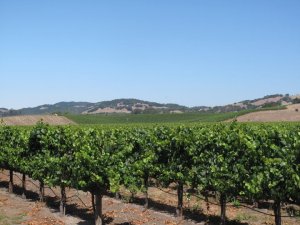This week was another busy one as I was out and about speaking at programs in Austin, Huntsville, and Ozona. Last Saturday, I was honored to be on a panel discussing the Future of Texas Agriculture at the Texas Tribune Festival in Austin. It was a wonderful event and the other folks on the panel, Blair Fitzsimons, Rep. Tracy King, Sid Miller, and Jim Sartwelle were absolutely fantastic. I appreciate Evan Smith’s invitation to participate in this event. To view the live blog overview of our session, click here (our session is about mid-way down the page). On Tuesday evening I headed to Huntsville to speak on grazing leases to a great group of Walker County folks. Thanks so County Extension Agent Reggie Lepley for setting up the program. Lastly, on Thursday morning, I made the drive to Ozona to discuss oil and gas lease negotiations and pipeline easements with a group of landowners. I appreciate all of the work Aaron Renfroe, the County Extension Agent in Crockett County, put into this program.
Here is the final weekly round up in September of ag law stories in the news.
* SAWS Considers Pipeline Contract to Pipe Water from Burleson County. After months of negotiations, the San Antonio Water System and Vista Ridge Consortium have agreed upon a proposed contract that would result in a $3.4 billion project to pump water from rural Burleson County, Texas to San Antonio. The proposed contract is expected to be considered by the SAWS Board on Monday, September 29 and, if approved by the Board, would then be considered by the San Antonio City Council in October. Under the proposed contract, Vista Ridge would deliver 50,000 acre feet of water per for 30 years, beginning in 2019. [Read articles here and here.]
* Texas Supreme Court Considers Important Case Regarding Statute of Limitations on Royalty Disputes. Last week, the Texas Supreme Court heard oral arguments in Hooks v. Samson Lone Star, L.P. The issue in the case is when the statute of limitations begins running against a royalty owner’s claim for underpayment of royalties. The plaintiff in the case claims that the defendant underpaid royalties and hid this from him by making fraudulent misrepresentations on royalty statements. In light of these misrepresentations, the plaintiff argues, the statute of limitations should have been tolled and his claim allowed to proceed. The defendant argues that the four-year statute of limitations for fraud cases applies and that the plaintiff could have discovered the underpayments by reviewing public records of productions. The trial court found in favor of the plaintiff, awarding him $21 million in damages. The First Circuit Court of Appeals in Houston reversed, finding that the claim was barred by the statute of limitations. This case could have important implications for Texas royalty owners and the duty imposed on them to investigate and confirm accurate royalty payments. The Supreme Court has taken the case under advisement. [Read article here.]
* Texas Department of Agriculture Modifies “Go Texan” Program Requirements for Wine. The TDA announced a new “pilot program” rule requiring that the”Go Texan” label on a wine product be used only if the product is made from at least 75% Texas-grown grapes. Previously, there was no requirement that the product be made from Texas-grown grapes. Thus, for example, a wine made from California grapes that was bottled in Texas would have qualified under the old rules. The new requirement will be effective for wines bottled after September 18, 2014. The rule will be in effect for the next 12 months and, at the end of that time, the rule will be re-=evaluated to determine if it results in increased Texas grape values, decreased consumer confusion regarding the “Go Texan” label, and results in increased consumption of wine produced from Texas grapes. [Read press release here.]
* EPA Withdraws Appeal in Alt Case. After losing at the appellate court level, the EPA has announced it will dismiss its case and not appeal of the decision in Alt v. United States Environmental Protection Agency over the scope of the Clean Water Act applied to agricultural storm runoff. As was discussed previously on the Texas Ag Law blog last year, the federal district court in West Virginia found that the farm did not have to obtain a permit from the EPA for storm runoff around her chicken houses. The EPA unsuccessfully argued for a much more narrow definition of “agricultural storm water,” which is, by law, exempt from the permitting requirements of the EPA. The case could still move forward if any of the environmental groups who intervened as plaintiffs in the case choose to continue. [Read article here].
* What Form of Social Media Best Suits Agricultural Industry? This was a question posed recently on a social media blogging site. The answer? Twitter! I found this surprising, but their rationale is that it is quick and easy to get involved in discussions with others in the industry. The article also discussed how agriculture is a unique industry because of our “community spirit” and willingness to help other farmers and ranchers in need. As someone who just recently began using Twitter to communicate ag law related news (follow me @TiffDowell), I thought this article was interesting and informative. [Read article here.]












